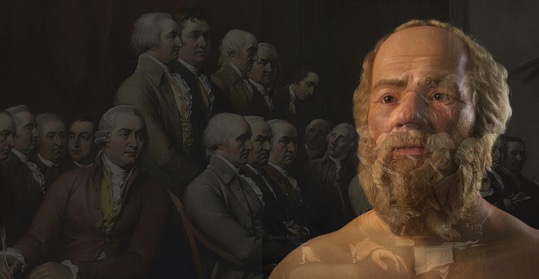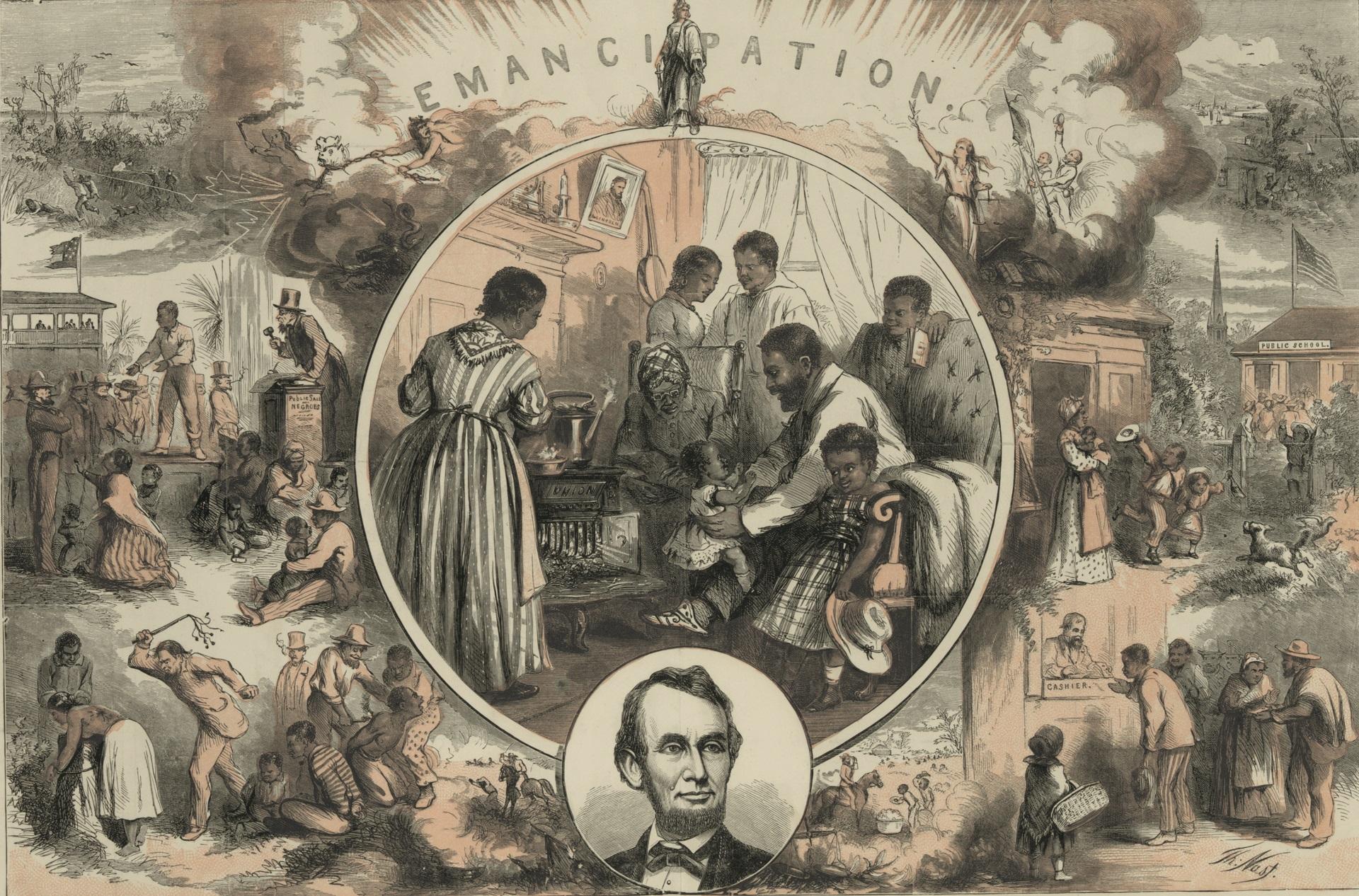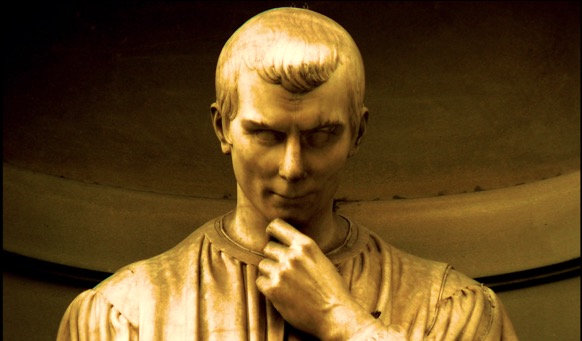Democracy and despotism in a digital age.
Virtue and Consent: the Twin Principles of Just Government

Libertarianism again fails natural right.
The teaser for David Gordon’s reply to me—“Harry Jaffa’s disciples are rather sensitive to criticism”—represents an old, tired, disreputable rhetorical trick. Attack someone baselessly and then attack them again for the impudence of responding, as if the existence of the reply is itself proof of the attackee’s unworthiness.
But what is one supposed to do when attacked or misrepresented? In this telling: shut up and take it. But then why did David Gordon respond to me? Is it because “Libertarians are rather sensitive to criticism”? See how that works?
Gordon’s actual article is better than this teaser (and much better than his first effort), which leads me to believe it to be an addition by a snarky editor, perhaps without Gordon’s foreknowledge or approval.
Wisdom vs. Consent?
But on to substance. I shall pass over the points on which Gordon now says we agree. Unlike my teacher Professor Jaffa—of whom William F. Buckley famously said, “If you think it’s hard disagreeing with Harry Jaffa, try agreeing with him!”—I endeavor to make it easy for people to agree with me.
A central element of our continued disagreement is the status of philosophy in Jaffa’s thought, and in particular the question of whether wisdom confers a title to rule. Gordon says that Jaffa did not really believe—as he professed to believe—that consent is a requirement for just rule. To support this opinion, he links to his own 2002 analysis of Jaffa that runs to nearly 19,000 (!) words—not counting its 122 footnotes. The article is impressive for the work that obviously went into it. Yet, despite being accused by Gordon of having written a “long” reply to his initial article, I believe I can summarize and clarify the issue at hand much more briefly.
The ancient philosophers do appear to teach that wisdom is the only just title to rule. The reason, they argue, is that any activity is best performed—perhaps only truly performed—and therefore ought to be performed, by one who knows how. On one level this is obvious. To imitate the kind of analogy that Plato’s Socrates uses frequently: what is better, a pair of shoes made by a cordwainer or one made by someone who doesn’t know how to make shoes? Would you rather sail on a ship commanded by a pilot or by someone who’s never been to sea? Etc.
The ancients extend this thought to ruling: the best rulers are those who best know how to rule. Since ruling is in a sense “comprehensive” and must take into account all human activities—their relationships to one another and relative importance—ruling is then not merely or simply a matter of specialized knowledge but of wisdom, of comprehensive knowledge, of knowledge of the whole—or at least of the most important parts of the whole. The digestive tracts of gnats—a matter of keen interest to Aristophanes’ lampoon of Socrates—are a part of the whole but not, to say the least, an important part nor one relevant to politics. “Wisdom” is then not the totality of all knowledge but of important knowledge, which includes the ability to distinguish between important and unimportant, relevant and irrelevant.
(Here I pause to state and refute, on the ancients’ terms, the anticipated libertarian retort that since much human activity is properly outside or beyond or above politics, comprehensive knowledge is not necessary. First, the ancients would deny that any human activity but philosophy is beyond politics; politics qua politics governs and prioritizes human activity and thus must be comprehensive. Second, the ancients would say that even if one were to conceive—as we moderns do—of a “private sphere” that politics should not touch, such a conception presupposes a comprehensive reflection on political things that identifies the existence and legitimacy of said “private sphere.” This comprehensive reflection in turn presupposes comprehensive knowledge of the whole, i.e., wisdom.)
So: rule requires knowledge and good rule requires the highest knowledge. Those possessing this highest knowledge are therefore best suited to rule.
This seems almost tautological but turns out to be hard to implement in practice. To state only a few of the more obvious problems: Many claim to know how to rule, but do they really? Or do they claim to know out of hubris, ignorance of their own limits, and/or selfish desire? While it is obvious that some are better and more adept at ruling than others (Washington, e.g., was better than Buchanan), superior knowledge is not wisdom as such. Has there ever been, in the history of man, a human being perfectly knowledgeable about ruling? If not, then wisdom’s title to rule would seem to be more tenuous than first appears. Similarly, the human soul is a mixture of appetites, passions and reason. All men are blessed with and/or subject to all three in varying degrees and combinations. Do not even the most reasonable men also have passions, some of which can be destructive?
The ancients are well aware of all this. In Plato’s Republic—the book that makes the argument for wisdom’s title to rule more intransigently than any other—the recommended regime is said to be a “city in speech,” i.e., not real, imaginary. There are any number of ways in which Plato indicates that his “city in speech” can never be. The coincidence of wisdom and political power is incredibly unlikely and depends on chance. Even if it could be realized, it can’t last because of the difficulty over the long term of maintaining the right mix of types of citizens—which is to say, of “breeding” a sufficient cadre of philosophic souls. And its establishment literally depends on expelling, from an existing city, every person over the age of ten. If we weren’t sure whether or not Plato means the city in speech as a practicable proposal, that last consideration ought to settle the matter.
Hence we must restate the classical argument for the rule of the wise as follows: If there were such a thing as a perfectly wise (and passion-free) ruler, and if he could establish and maintain his rule over the unwise, then such a person could justly rule others without their consent.
Democratic Wisdom
The American Founders—emphatic believers in the principles of equality and government by consent—agreed. Hence Madison’s glib remark in Federalist 51 that “If men were angels, no government would be necessary. If angels were to govern men, neither external nor internal controls on government would be necessary.” Or, as another Founding-era statement put it: God, “being possessed of infinite wisdom, goodness, and rectitude, is alone fit to possess unlimited power.”
Another way to state the issue is by recourse to the ancient question: which is superior, the rule of men or the rule of law? According to the classics, the rule of men is superior, or would be, provided they are the right men, the truly wise. The reason is that law as such is limited. Even the wisest legislator cannot anticipate every situation the future may bring. Inevitably, decisions will have to be made in circumstances to which the law does not speak or is inadequate. The judgment of individual men will be necessary. And we would want those individual men to be wise so that they judge and act wisely.
Yet, as we have seen, there do not appear to be any truly wise men. And even if there were, their ability to persuade the unwise is limited, even non-existent. The rule of the wise is eminently impractical. Far more likely than the actual rule of the wise is the rule of the unwise who claim to be wise and who pander to the basest desires of basest elements of society. In other words, the very argument in favor of the rule of the wise can serve demagogues and tyrants.
The practical solution to this practical dilemma is to balance the requirement for wisdom with a requirement for consent. Here is Leo Strauss:
According to the classics, the best way of meeting these two entirely different requirements…would be that a wise legislator frame a code which the citizen body, duly persuaded, freely adopts. That code, which is, as it were, the embodiment of wisdom, must be as little subject to alteration as possible; the rule of law is to take the place of the rule of men, however wise.
It also important to remember that there is a distinction between philosophers, who are not wise but seek wisdom, and the truly wise man who as such is no longer a philosopher, who no longer seeks wisdom but has achieved it. In the ancients’ telling, philosophers are rare but they definitely do exist. Wise men, or perfect sages, may never have existed. Socrates went to his death insisting on his own ignorance—“All I know is that I know nothing”—i.e., he denied being a wise man. Hence Gordon’s use of the phrase “wise philosophers” is itself an oxymoron.
The closest real-world approximation we have to the wise man is then the philosopher. Recall from Plato’s Republic that philosophers do not wish to rule but must be forced to rule. Jaffa summarizes the paradox thus:
Anyone who asserts a right to rule on the basis of his claim to wisdom is accordingly condemned in advance as a charlatan by philosophy itself…. Philosopher-kings are not possible, and genuine philosophers will always prefer a regime of equality under the law.
Jaffa’s student, and my teacher, Tom West draws out the conclusion:
Jaffa is saying that the classical argument for government without consent is refuted by the classics themselves, leaving us with the conclusion that the esoteric teaching, as it were, of the classics is that all men are created equal!
This business of “esotericism” is of course central to Strauss’s teaching and endorsed—sometimes furthered—by nearly all his followers. The argument, in a nutshell, is that many of the greatest thinker-writers present more than one teaching. Esoteric work presents a surface that comports, more or less, with accepted elite and/or public opinion of their time. But they also possess a depth or core at odds with accepted opinion. This core is accessible by “reading between the lines” or paying careful attention to various “mistakes”—errors, omissions, contradictions, misquotations, willful distortions of sources, repetitions with unacknowledged changes, examples that undermine or contradict explicit statements, etc.—in the surface of the text and thinking through what they might mean.
This assertion remains controversial and has been—and still is—a source of much mirth among the enemies of Strauss and his school. Secret writing! I point those interested in iron-clad proof that Strauss was right that esotericism is real to Arthur Melzer’s Philosophy Between the Lines.
Essentially, Gordon accuses Jaffa of esoteric insincerity about the American Founders and the meaning of equality in the Declaration of Independence. In Gordon’s telling, Jaffa says he believes that all men are created equal and that government derives its just powers from the consent of the governed, but he doesn’t really. According to Gordon, Jaffa’s true teaching was “rule by wise philosophers like himself.”
If by this phrase, Gordon simply meant that Jaffa agrees with the classics on the superiority in principle of the rule of the wise over the rule of the unwise, that would be as unobjectionable as it is unilluminating. But the phrase “like himself” makes clear that this is not what Gordon means. This phrase adds two important qualifications, both of which make Gordon’s statement false. First, it more than implies that “rule by wise philosophers” was Jaffa’s practical recommendation for real politics in the real world: to turn over the machinery of the state to Jaffa and people like him. The second implication inevitably follows: that Jaffa rejects the practical requirement, sketched above, to balance the benefits of wisdom with the requirement for consent, or that Jaffa altogether discards the principle of consent.
Gordon here betrays his fundamental misunderstanding of the arguments under consideration and of Jaffa’s writings. Jaffa could not and did not teach “rule by wise philosophers like himself,” first, because he understood the distinction between philosophy and wisdom; second, because he did not believe himself to be either “wise” or a “philosopher”; third, because he was nonetheless wise enough to know that however desirable the rule of the wise might be in principle, it is impossible in practice; fourth because he took seriously—no less seriously than the classics or the American Founders—the justice, dignity and necessity of the requirement for consent.
Gordon’s argument presupposes that wisdom and consent are irreconcilable; indeed, his entire argument stands or falls by the validity of that presupposition. But as we have seen, the ancients no less than the American founders saw that, while the two are in tension, they do not stand in irreconcilable opposition. Is it any surprise, then, that Harry Jaffa—a self-identified follower of both Aristotle and the American founders—believed the same?
Approximating Justice
The question, then, is not whether the rule of the wise is superior to the rule of the unwise—it obviously is. The question is the practicality of implementing the rule of the wise. Can it be done? At least, can it be done in the way in which Plato appears to recommend in the Republic? We have seen that here the American founders agree with the classical philosophers in concluding: No, it cannot. And Jaffa follows both.
This claim—the impossibility of the best form of government—may seem paradoxical, for how can something impossible be the best? But impossible not does not necessarily mean “non-existent.” A thing may be impossible to achieve in the human realm but still exist in the abstract, in the same way that Plato argues that the form or idea of a thing is no less real—and in his telling more real—than its imperfect real-world copies. Put another way, because an asymptotic curve approaches a given line but never reaches it, we do not therefore deny that the line exists. To borrow words from Lincoln that Jaffa quoted often, America’s Founding principles constitute a
standard maxim for free society, which should be familiar to all, and revered by all; constantly looked to, constantly labored for, and even though never perfectly attained, constantly approximated, and thereby constantly spreading and deepening its influence, and augmenting the happiness and value of life to all people of all colors everywhere. [Emphasis added.]
The rule of the wise is just such a thing: something to be striven for yet never perfectly attained. Because while wisdom understood as perfect knowledge of the whole does not and likely cannot exist in the mind of any man, nonetheless the whole exists, its parts are knowable, therefore in principle all of its parts are knowable, as is their relation to one another. Thus we need not—must not—abandon wisdom as a standard. We instead must be prudent in the application of that standard.
In the absence of the truly wise, we seek guidance from those who best approximate wisdom. No one knowingly chooses to be ruled by the unwise or the anti-wise, though human beings can be sadly prone to mistaking unwisdom for wisdom. The best practicable form of government, then, is to steer as much wisdom as possible into the operations of the state: to approximate the rule of the wise as closely as possible as often as possible. Or, in words of Jefferson that Jaffa also liked to quote,
there is a natural aristocracy among men. The grounds of this are virtue and talents…. There is also an artificial aristocracy founded on wealth and birth, without either virtue or talents; for with these it would belong to the first class. The natural aristocracy I consider as the most precious gift of nature for the instruction, the trusts, and government of society. And indeed it would have been inconsistent in creation to have formed man for the social state, and not to have provided virtue and wisdom enough to manage the concerns of the society. May we not even say that that form of government is the best which provides the most effectually for a pure selection of these natural aristoi into the offices of government? [Emphasis added.]
We will at certain times do better at this than at others; recall Madison’s warning that “enlightened statesmen will not always be at the helm” (Federalist 10). But the qualifier “always” indicates that enlightened statesmen will sometimes be at the helm, and the more they are, the better.
Note also that the passage quoted above on “natural aristoi” was penned by the man who wrote the Declaration of Independence—the very statement of principle that Gordon claims Jaffa esoterically rejects. In fact, all of the textual points that Gordon cites as evidence of Jaffa “contradicting” himself in order to hide his real meaning are easily explained as explications of the inherently contradictory or paradoxical nature of the underlying phenomenon. No recourse to esotericism is necessary. As Strauss himself once put it, “reading between the lines is strictly prohibited in all cases where it would be less exact than not doing so.”
For Gordon’s claim to be true, Jaffa would have to have shrunk from saying aloud what the classics immortalized in print. Indeed, Gordon’s formulation reverses the conclusion sketched above: if the classics’ exoteric or public teaching was the rule of the wise while their secret teaching was government by consent, for Gordon Jaffa’s exoteric teaching is government by consent while his true teaching is the rule of the wise!
East vs. West
I do not know if Gordon is aware of the distinction between the “East Coast” and “West Coast” schools of Straussianism—a distinction or schism which Jaffa more than anyone created. Gordon at any rate does not mention it. But his conclusion would certainly surprise Jaffa’s rivals (and enemies) in the Eastern camp.
Again, to summarize briefly, we have seen that Jaffa finds much continuity between ancient political philosophy and the political theory of the American founding. This is, to say the least, not the view of the East Coast Straussians, who see a fundamental break between ancient and modern thought that carries over into modern political practice and who profess a strong preference for the ancients. They more or less agree with Gordon: one can have wisdom or consent but not both. In their view, the American regime is based simply on consent and dispenses with wisdom; it is therefore “low but solid.” They see Jaffa’s attempt to graft onto the founding higher principles of classical political philosophy as either arising from a misreading of the classics or as a deliberate attempt to attribute to the founding a nobility it lacks—in either case, false and illegitimate. (These are not the only issues dividing East from West, just the most relevant here.)
The East-Coasters would and do reject Jaffa’s claim that “the esoteric teaching of the classics is that all men are created equal.” In their telling, the esoteric teaching of the classics is even more radically anti-democratic than their exoteric teaching in favor of the rule of the wise. Indeed, if anyone today “teaches rule by wise philosophers like [themselves],” it is not Jaffa but the East Coast Straussians! How bewildered they must be to learn from Gordon that Harry Jaffa—a man they always considered philosophically naïve, too political, too invested in America to understand philosophy’s true depths—has been one of them all along!
As a practical matter, one must ask: If indeed Jaffa hid his alleged dismissal of the Founding principles behind a Fort Knox of language supporting those principles, why did he do so? The first reason Strauss gives for the practice of esoteric writing is to avoid persecution. What carries more risk? Standing up for the Founding principles or dismissing them? Strauss himself asked, as early as 1952:
Does this nation in its maturity still cherish the faith in which it was conceived and raised? Does it still hold those “truths to be self-evident”?
The answer, at least among elites, was already—and clearly—“No.” Despite Jaffa’s best efforts, the rejection of natural right—both in its specifically American form and its antecedent philosophic form—has only gained strength and currency in the intervening decades. If Jaffa agreed with that rejection, he had no reason to hide anything. By sticking up for natural right, he was choosing the losing side—certainly in the academy, and even within conservatism. That’s not the way esotericism is typically practiced. To the contrary, the esotericist pretends to side with ruling opinion when really he doesn’t. It might have been necessary to hide one’s rejection of natural right in the America of, say, 1870 or 1920, but not by 1950 and certainly not by 1970!
Religion in a Republic
As to the rest: Gordon denies that the quotation marks he put around “group rights” were intended as “sneer quotes.” Since the context was in the midst of a dismissive caricature of Jaffa’s thought, that seemed a reasonable inference to make. Gordon—despite my asking him directly—still does not say whether he does or doesn’t believe in the concept of group rights as understood by Calhoun and the modern woke left, nor does he say if he thinks I have interpreted that concept correctly or incorrectly. So, it still seems to me that he dismisses my analysis of the destructiveness of “group rights” as only so much Jaffa-ite nonsense. If he doesn’t, I once again invite him to clarify.
Gordon then makes what appears to be an extraordinary admission. He objects to my statement that, in a modern republic governed according the principles of the American founding, only religions that recognize the distinction between civil and religious law are compatible with such government. In his prior piece, he (mis)characterized this thought of mine as follows:
religion is allotted its place, but it is subject to suppression if clergy dare to contradict the “civil religion” of equality that everyone must profess.
I confess I didn’t know then what he had in mind, but it’s a little clearer now. Apparently, for Gordon, if and when adherents of a religion claim that their religious law supersedes civil law—or even deny the legitimacy of civil law and insist that the only valid law is their faith’s religious law—if the civil authority acts to enforce civil law in contravention of what said religious adherents want, that amounts to “suppression.”
Gordon thus has not, to say the least, refuted my contention that for modern republicanism to work, the people no less than the state must recognize the fundamental distinction between civil and religious law. He has rather strengthened that contention. Moreover, he appears to have taken sides—with those who wish to assert the supremacy of religious over civil law.
Gordon reveals his fundamental confusion with these words, again (mis)characterizing my thought: “it is not enough that religious believers refrain from violating the rights of those who reject their religion.” No, actually, that is quite enough. But it’s also compatible with—and nearly identical to—the assertion that only those faiths that recognize the fundamental distinction between civil and religious law are compatible with republican government. To “refrain from violating the rights of those who reject their religion” is an indispensable element of recognizing the distinction between civil and religious law.
In the modern republican conception, religious law governs matters of private conscience and worship that do not impinge on the rights of others, do not obligate non-believers, and are irrelevant to the functioning of the state. The civil law by contrast fundamentally concerns public matters. The civil law may be informed by religious opinion and even law but ultimately is enacted on a rational basis via public deliberation by men of all faiths, and even of no faith. Whether transubstantiation is real or not, whether to keep kosher, and so on, are matters of private import but public indifference. Not murdering or stealing from fellow citizens are inherently public matters—and knowable as such even if they are also forbidden by God’s law.
But as we are all aware, there is an older tradition which rejects any such distinction and which, despite being old, is far from confined to the past. So what of those whose religious law does not recognize any conception of “the rights of those who reject their religion”—or any conception of “rights” at all? Whose religious law condemns as inferior or defective those not professing their own faith? In Gordon’s terms, enforcing the civil law against acts taken in adherence with such religious law is “suppression.”
This is libertarianism taken either to an absurd extreme or to its logical conclusion—perhaps both. Act as illiberally as you want in the name of God, and if the state intervenes, that’s “suppression”! As ever for libertarians, any and all forms of tyranny are OK so long as they’re not performed by the state. Like the capitalist who will sell his hangman the rope from which he is hung, a libertarian will oppose any government restrictions on the scimitar by which he is beheaded.
The rest of Gordon’s reply is hair-splitting, uninteresting even to me, who is often criticized for going on too “long.” So, the important topics having being covered, I will stop there.
The American Mind presents a range of perspectives. Views are writers’ own and do not necessarily represent those of The Claremont Institute.
The American Mind is a publication of the Claremont Institute, a non-profit 501(c)(3) organization, dedicated to restoring the principles of the American Founding to their rightful, preeminent authority in our national life. Interested in supporting our work? Gifts to the Claremont Institute are tax-deductible.
Debunking a contradiction in terms.
Revisionist Black supremacist history can't grasp our shared equality.
In a collapsing age, humor and spirit alone won’t do us justice.
It’s time to bet on humanity—before things get worse.






